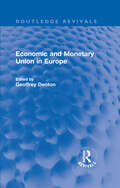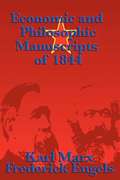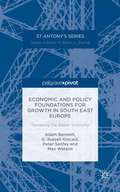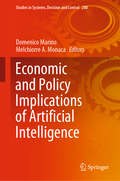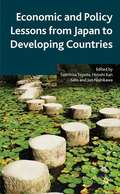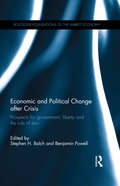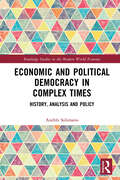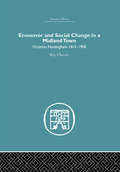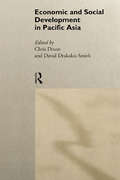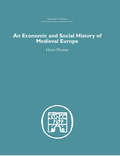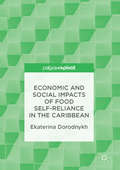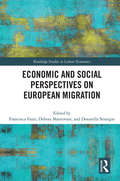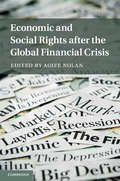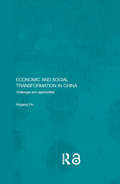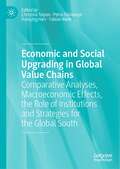- Table View
- List View
Economic and Legal Considerations of Optimal Privatization: Case Studies of Mortgage Firms (DePfa Group and Fannie Mae)
by Claudia Dziobek Hans-Joachim Beyer John R. GarrettA report from the International Monetary Fund.
Economic and Monetary Union in Europe (Routledge Revivals)
by Geoffrey DentonIn its pursuit of economic integration, economic and monetary union (EMU) had become a primary commitment for the European Community. Originally published in 1974, this study sets out to examine the meaning of economic union and its relationship with monetary union. The contributors look at the problems and costs for attaining economic union for the member states of the EEC at the time. Steven Robson writes on economic management. Paul Woolley examines the integration of capital markets. Santosh Mukherjee looks at the implications of labour market policy. Geoffrey Denton and Adam Ridley consider the impact of economic and monetary union on regional problems. Alan Prest is concerned with tax harmonisation specifically Value Added Tax and Corporation Tax and Douglas Dosser discusses the development of a European Community budget. Though the long-term benefits of EMU were clear, in the short term it would impose strains and pressures on national economies and particular sectors within them. This study goes a long way to clarifying where these difficulties would arise and suggests some ways of coping with them.
Economic and Philosophic Manuscripts of 1844
by Karl MarxIn the Economic and Philosophic Manuscripts of 1844 Marx explains how, under capitalism, people rely on labor to live. In the past people could rely on Nature itself for their natural needs; in modern society, if one wants to eat, one must work: it is only through money that one may survive. Thus, man becomes a slave to his wages. It is only through his work that he can find enough money to continue to live; but he doesn't simply live, he actually only survives, as a worker. Labor is only used to create more wealth, instead of achieving the fulfillment of human nature. Wilder Publications is a green publisher. All of our books are printed to order. This reduces waste and helps us keep prices low while greatly reducing our impact on the environment.
Economic and Policy Foundations for Growth in South East Europe: Remaking The Balkan Economy (St Antony's)
by Adam Bennett Peter Sanfey Max Watson G. KincaidThis volume argues that a renewed commitment to sound macroeconomic policies and structural reforms is needed for countries in South East Europe, or 'the Balkans' achieve to sustainable prosperity, along with enhanced support from the international community. New fiscal and financial architecture has valuable lessons for policymakers in SEE.
Economic and Policy Implications of Artificial Intelligence (Studies in Systems, Decision and Control #288)
by Domenico Marino Melchiorre A. MonacaThis book presents original research articles addressing various aspects of artificial intelligence as applied to economics, law, management and optimization. The topics discussed include economics, policies, finance, law, resource allocation strategies and information technology. Combining the input of contributing professors and researchers from Italian and international universities, the book will be of interest to students, researchers and practitioners, as well as members of the general public interested in the economic and policy implications of artificial intelligence.
Economic and Policy Lessons from Japan to Developing Countries
by Toshihisa Toyoda Jun Nishikawa Hiroshi Kan SatoWritten by fifteen leading academics from the Japan Society for International Development (JASID), this book undertakes a review of Japan's economic development over the previous 150 years, and seeks to clarify Japanese priorities in domestic and foreign policy for the coming decades. Contributors from a variety of disciplines evaluate Japan's own experience in achieving economic development, focusing on topical issues such as the role of the environment, community governance and disaster management. Globalization and economic growth has also brought about a sea-change in Japan's development cooperation policy; the new orientation of this policy is explored in full. This book will be a fruitful resource for policymakers in developing nations as well as academics with an interest in the modernization of non-Western societies.
Economic and Political Aspects of EU-Asian Relations: Selected Papers from The Vietnam-EU Economic and Trade Forum 2023
by An Thinh Nguyen Truc Le Nguyen Ewa Ślęzak-Belowska Marcin SalamagaThis book brings together selected papers from the The Vietnam-EU Economic and Trade Forum 2023 jointly organized by the VNU University of Economics and Business (UEB, Vietnam) and Krakow University of Economics (Poland). The book deals with the economic and political relationship between Asian and EU countries in the context of globalization, sustainable development, and climate change responses. This book covers a wide range of topics, such as Asian-EU economic-politic relation promotion, policies for environmental protection, green growth and climate change responses in Asian and EU countries, and education, culture, science and technology, and innovation cooperation between Asian and EU countries.
Economic and Political Change after Crisis: Prospects for government, liberty and the rule of law (Routledge Foundations of the Market Economy)
by Benjamin Powell Stephen H. BalchThe U.S. Government’s accumulated national debt and unfunded liabilities in social security and Medicare could be pushing the country towards a fiscal crisis. How could such a crisis be avoided? If a crisis does strike, how might it be dealt with? What might be the long term ramifications of experiencing a crisis? The contributors to Economic and Political Change After Crisis explore all of these questions and more. The book begins by exploring how past crises have permanently increased the size and scope of government and how well the rule of law has been maintained during these crises. Chapters explore how these relationships might change in a future crisis and examine how the structure of the U.S. government contributes to a tendency towards fiscal imbalance. In a provocative contribution, the authors predict a U.S. government default on its debt. The book concludes by considering how a fiscal crisis might precipitate or interact with other forms of crises. Social scientists from a variety of disciplines, public policy makers, and concerned members of the general public would all benefit from the contributions contained in this book. If the U.S. is going to avoid a future crisis, or do as well as possible if a crisis occurs, the arguments in these chapters should be given serious consideration.
Economic and Political Democracy in Complex Times: History, Analysis and Policy (Routledge Studies in the Modern World Economy)
by Andrés SolimanoThe concept of economic democracy is traditionally identified with workplace democracy and participation at the enterprise level. This is a very important dimension, but the concept of new economic democracy also recognizes that, in a world of increasing complexity, the principles of democratic deliberation and social participation have to be applied to other areas as well. This book takes a fresh look at economic democracy from various perspectives. It provides rich historical narratives of episodes of social participation in the economy and society, more broadly, from the 19th to the 21st century. It dissects the various analytical underpinnings informing the theory of economic democracy connecting it with collective choice, social contract theory, Marxian analysis and libertarian critiques. The book identifies new areas of application of the principles of democratic deliberation and oversight such as the adoption of austerity policies, the signing of free trade agreements, the conduct of central bank policies, international investment treaties and natural resource management. It takes a guided tour through the evolution of economic, social and cultural rights and their impact on the design and implementation of social policy and the welfare/developmental state. The book expands the notion of economic democracy from factory level to the macro-economy and then to global economic governance. It also discusses the critical links between political democracy and economic democracy and the need for a more democratic and socially equitable economy in the 21st century. This volume will find an audience among economists, political scientists, social activists, philosophers and sociologists.
Economic and Social Change in a Midland Town: Victorian Nottingham 1815-1900
by Roy A. ChurchThis book was first published in 1966. The city of Nottingham grew from the nucleus of a smaller and older town to become one of the nation's leading industrial centres, and although it was not a product of the industrial revolution Nottingham was completely transformed by it. For most of the nineteenth century the major activities were the production of hosiery by an industry whose methods, organization, and outlook remained traditional for many decades, and the manufacture of machine-made lace, a progressive and mechanized industry which from its early years featured factory production. This text explores the relationship between the development of power based machinery and the more traditional crafts of the area.
Economic and Social Cohesion in Europe: A New Objective
by Achille HannequartWith discussions of a full internal market within the EC finally reaching fruition, and regular intergovernmental talks advancing the ideas of economic, monetary and perhaps eventually political union, economic and social cohesion has become a major objective of Community policy.Regional disparities remain a hard fact of Community life. Although th
Economic and Social Development in Pacific Asia
by Chris Dixon David Drakakis-SmithFirst published in 1993. Routledge is an imprint of Taylor & Francis, an informa company.
Economic and Social Development of Bangladesh
by Yasuyuki Sawada Minhaj Mahmud Naohiro KitanoThis book discusses Bangladesh's economic and social development that may be called a "miracle" since the country has achieved remarkable development progress under several unfavorable situations: weak governance and political instabilities, inequality, risks entailed in rapid urbanization, and exposure to severe disaster risks. The authors examine what led to this successful economic development, and the potential challenges that it presents, aiming to elicit effective policy interventions that can be adapted by other developing countries.
Economic and Social History of Medieval Europe
by Henri PirenneFirst published in 2005. Routledge is an imprint of Taylor & Francis, an informa company.
Economic and Social Impacts of Food Self-Reliance in the Caribbean
by Ekaterina DorodnykhThis book provides a multilayered analysis of food import dependency and its impact on food security in the Caribbean region. The study analyses the main impact of trade liberalization in the Caribbean within the WTO framework and main policy mechanisms to support domestic food production in order to reduce food import dependency. Moreover, the author evaluates economic and social benefits of food self-sufficiency as a strategy aimed to improve domestic food production by increased availability of locally produced food products.
Economic and Social Perspectives on European Migration (Routledge Studies in Labour Economics)
by Francesca FauriThis book addresses a wide range of migration-related issues in the European context and examines the socioeconomic consequences of migratory flows throughout Europe, focusing on a number of emblematic European countries. The book is divided into three parts. The first part deals with the tension between migrants and their integration processes in the receiving country, which is deeply influenced by the attitude of the local population and the different approach to highly and less skilled immigrants. The second part analyses the impact of migration on the economic structure of the receiving country, while the third part explores the varying degree of immigrants’ socioeconomic integration in the country of destination. The book offers an essential interdisciplinary contribution to the issue of migration and provides readers with a better understanding of the effects that different forms of migration have had and will continue to exert on economic and social change in host countries. It also examines migration policy issues and builds on historical and empirical case studies with policy recommendations on labour market, integration and welfare policy issues. The book is addressed to a wide audience, including researchers, academics and students of economics, sociology, politics and history, as well as government/EU officials working on migration topics.
Economic and Social Rights after the Global Financial Crisis
by Aoife NolanThe global financial and economic crises have had a devastating impact on economic and social rights. These rights were ignored by economic policy makers prior to the crises and continue to be disregarded in the current 'age of austerity'. This is the first book to focus squarely on the interrelationship between contemporary and historic economic and financial crises, the responses thereto, and the resulting impact upon economic and social rights. Chapters examine the obligations imposed by such rights in terms of domestic and supranational crisis-related policy and law, and argue for a response to the crises that integrates these human rights considerations. The expert international contributors, both academics and practitioners, are drawn from a range of disciplines including law, economics, development and political science. The collection is thus uniquely placed to address debates and developments from a range of disciplinary, geographical and professional perspectives.
Economic and Social Transformation in China: Challenges and Opportunities (Routledge Studies on the Chinese Economy #Vol. 23)
by Angang HuThe Center for China Studies is among China’s most influential think-tanks, and its China Studies Reports are read at the highest levels of government. Now for the first time, the most important of these reports is collected in book form in English, providing a fascinating insight into the challenges and opportunities for Chinese development and the government’s thinking on economic and social issues. Including comparative studies with developed and developing nations, analysis of past economic performance and future trends, and effects of demographic shifts such as population ageing and urbanization, this book is an essential collection of research and includes notes made by central party leaders. Compiled by the founder of the Center for China Studies, one of the country’s leading economists, this book is key to understanding Chinese development and the likely future path of government policy.
Economic and Social Upgrading in Global Value Chains: Comparative Analyses, Macroeconomic Effects, the Role of Institutions and Strategies for the Global South
by Hansjörg Herr Christina Teipen Petra Dünhaupt Fabian MehlThis book investigates how global value chain governance, public institutions and strategies in the area of industrial policy and industrial relations by stakeholders such as national or global trade unions, governments, companies or international NGOs shape upgrading in the Global South. A special feature is its interdisciplinarity, combining sociological, economic, legal and political dimensions. Case studies systematically compare different industry trajectories. Furthermore, it encompasses far-reaching insights into the role of global value chains for development, economic catching-up of countries and socio-political aspects such as working conditions and interest representation.

